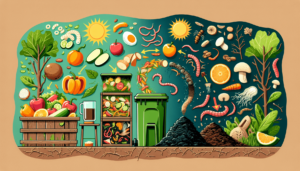Have you ever wondered about the advantages of composting? Well, let us enlighten you! Composting is an environmentally friendly practice that not only reduces waste but also provides numerous benefits for both our gardens and the planet. By converting organic materials like food scraps, grass clippings, and leaves into nutrient-rich compost, we can improve soil quality, promote plant growth, and even reduce greenhouse gas emissions. In this article, we will explore the incredible benefits of composting and how you can easily incorporate this sustainable practice into your daily life. So, let’s dig in and discover the transformative power of composting!

Environmental Benefits
Composting is an environmentally friendly practice that offers a multitude of benefits for our planet. One significant advantage is its ability to reduce landfill waste. Approximately 30% of what we throw away is compostable organic material, such as food scraps and yard waste. By diverting this waste from landfills and instead composting it, we can significantly reduce the amount of garbage accumulating in these already overflowing waste sites. As a result, we can extend the lifespan of landfills and minimize their negative impacts on the environment.
But composting doesn’t stop at reducing landfill waste alone; it also helps minimize greenhouse gas emissions. When organic waste breaks down in landfills, it decomposes under anaerobic conditions, producing methane gas. Methane is a potent greenhouse gas that is around 25 times more potent than carbon dioxide in terms of its global warming potential. However, by composting organic waste, we create an aerobic environment that allows the waste to decompose naturally, reducing the generation of methane. This simple act of composting can play a significant role in curbing climate change and reducing our carbon footprint.
In addition to reducing landfill waste and greenhouse gas emissions, composting also offers benefits in terms of conserving water resources. Compost-amended soils have enhanced water-holding capacity, reducing the need for excessive irrigation. The organic matter in compost acts like a sponge, absorbing and retaining water, making it more available to plants over time. By improving soil structure and moisture retention, composting helps conserve water resources, an essential aspect of sustainable agricultural practices.
Improves Soil Health
Composting plays a vital role in improving soil health, and the benefits it offers in this regard are truly remarkable. For starters, composting enriches the soil with essential nutrients. As organic matter decomposes, it releases valuable nutrients such as nitrogen, phosphorus, and potassium into the soil, which are vital for plant growth and development. By adding compost to our soil, we can ensure that it remains nutrient-rich, providing a fertile environment for plants to thrive.
Moreover, composting enhances soil structure. When compost is added to soil, it acts as a binding agent, improving soil aggregation and creating a healthier microenvironment for plants. This enhanced structure allows for better water infiltration and drainage, prevents soil compaction, and reduces erosion, all of which are crucial for maintaining healthy and productive soil.
Furthermore, composting promotes microbial activity in the soil. The organic matter in compost provides a food source for beneficial soil microorganisms, such as bacteria, fungi, and earthworms. These microorganisms play a vital role in nutrient cycling, breaking down organic matter, and improving soil fertility. By incorporating compost into our soil, we can create a thriving and diverse microbial community that supports the overall health and productivity of our soil.
Saves Money
One often overlooked benefit of composting is the significant cost savings it can offer. By composting organic waste, we can reduce the need for chemical fertilizers. Chemical fertilizers can be expensive, and their production and transportation have a negative impact on the environment. However, by utilizing compost as a natural fertilizer, we can provide our plants with the necessary nutrients in a sustainable and cost-effective manner.
Composting also helps decrease waste disposal costs. As mentioned earlier, a significant portion of waste we generate is compostable organic material. By diverting this waste from landfills and composting it instead, we can reduce the amount of waste being sent to expensive disposal facilities. This decrease in waste disposal costs can lead to significant savings for municipalities, businesses, and individuals alike.
Reduces Erosion
Composting plays a crucial role in reducing erosion and preserving the integrity of our soil. When soil lacks organic matter and nutrients, it becomes more susceptible to erosion, particularly from wind and water. However, by incorporating compost into the soil, we can improve soil stabilization and prevent topsoil loss.
Compost acts as a natural erosion control mechanism by promoting the development of a stable soil structure. The organic matter in compost helps bind soil particles together, creating aggregates that are more resistant to erosion. These stable soil aggregates provide a protective barrier against the forces of wind and water, reducing the risk of topsoil being washed or blown away. By preventing erosion, composting helps preserve the vital topsoil layer, which is rich in nutrients and essential for productive agriculture and healthy ecosystems.
Preserves Biodiversity
Composting is not only beneficial for our soil but also for the preservation of biodiversity. By creating habitat for beneficial organisms, composting helps support the diversity of life in our surrounding environment. As compost decomposes, it attracts a wide range of organisms, including earthworms, insects, and microorganisms, which play essential roles in maintaining ecosystem balance.
These beneficial organisms contribute to nutrient cycling, breakdown of organic matter, and overall soil health. They also attract predator species, such as birds and beneficial insects, which help control pests naturally. By promoting the presence of beneficial organisms through composting, we can create a biodiverse and balanced ecosystem that is resilient and sustainable.
Furthermore, composting promotes plant diversity. When compost is added to the soil, it enriches it with nutrients, improves soil structure, and enhances microbial activity, creating an optimal environment for a variety of plant species to thrive. This increased plant diversity has many benefits, including improved ecosystem resilience, increased tolerance to pests and diseases, and enhanced aesthetic value in gardens and landscapes.
Supports Sustainable Agriculture
Composting plays a vital role in supporting sustainable agriculture practices. One key benefit is its ability to increase crop productivity. By adding compost to agricultural fields, we can enhance soil fertility and provide plants with the necessary nutrients for healthy growth. This improved soil fertility leads to increased crop yields and improved food security.
In addition to increasing crop productivity, composting also reduces the dependency on synthetic inputs. Chemical fertilizers and pesticides are commonly used in conventional agriculture to boost crop yields and control pests. However, these synthetic inputs have negative environmental impacts and can degrade soil health over time. By incorporating compost into agricultural practices, farmers can reduce their reliance on synthetic inputs, promoting more sustainable and environmentally friendly farming methods.
Reduces Water Pollution
Composting plays a crucial role in reducing water pollution, particularly from nutrient runoff and pesticide contamination. When synthetic fertilizers or pesticides are applied to agricultural fields, they can run off with rainfall or irrigation water and enter nearby water bodies, leading to pollution and ecological damage. However, by utilizing compost as a natural fertilizer, we can prevent nutrient runoff.
Compost-amended soils have improved water-holding capacity and reduce the likelihood of excess nutrients being washed away. The organic matter in compost acts like a sponge, absorbing and retaining nutrients, making them more available to plants without being washed off into water bodies. By reducing nutrient runoff, composting helps protect water quality and preserve the health of aquatic ecosystems.
Moreover, composting minimizes pesticide contamination. When compost is added to soil, it helps improve soil health and promotes the presence of beneficial organisms that naturally control pests. This biological pest control reduces the need for synthetic pesticides, minimizing the risk of pesticide contamination in our water bodies. By using compost as a natural pest control method, we can reduce water pollution and promote more sustainable farming practices.
Mitigates Climate Change
Composting plays a significant role in mitigating climate change by sequestering carbon in the soil and reducing reliance on fossil fuel-based products. When organic waste breaks down in landfills, it produces methane, a potent greenhouse gas. However, by composting organic waste, we create an aerobic environment that allows the waste to decompose naturally, reducing the generation of methane.
Additionally, compost-amended soils have increased carbon content. The organic matter in compost contains carbon, which is retained in the soil when compost is added. This carbon sequestration helps offset carbon dioxide emissions, mitigating the impacts of climate change.
Composting also reduces reliance on fossil fuel-based products. In conventional agriculture, synthetic fertilizers, pesticides, and even plastic mulches are commonly used. The production, transportation, and disposal of these inputs and materials require a significant amount of energy derived from fossil fuels. By opting for composting and organic farming practices, we can reduce the reliance on these fossil fuel-based products, reducing greenhouse gas emissions and promoting a more sustainable future.
Promotes Community Engagement
Composting is not only beneficial for the environment but also for community engagement and education. By encouraging composting and providing educational opportunities, we can foster a sense of environmental responsibility and promote sustainable practices within our communities.
Community composting programs and initiatives can serve as platforms for knowledge sharing and engagement. These programs can provide workshops, educational materials, and hands-on experiences to teach community members about the benefits of composting and how to incorporate it into their daily lives. By engaging the community in composting initiatives, we can empower individuals to make environmentally conscious choices and contribute to a more sustainable future for all.
Furthermore, composting can serve as a starting point for broader conversations about sustainable living and the interconnectedness of our actions with the environment. By highlighting the various benefits of composting, we can inspire individuals to explore other sustainable practices and make positive changes in their daily lives.
Improves Waste Management Practices
Composting significantly improves waste management practices by diverting organic waste from landfills and reducing overall waste generation. As mentioned earlier, approximately 30% of what we throw away is compostable organic material. By diverting this waste from landfills and composting it instead, we can significantly reduce the amount of waste being sent to these already overflowing disposal facilities.
Composting organic waste not only reduces the strain on landfills but also helps turn waste into a valuable resource. The organic matter that goes into composting can be transformed into nutrient-rich soil amendment, providing a sustainable and locally produced resource for gardening, landscaping, and agriculture. This closed-loop approach to waste management helps create a more circular economy and minimizes the need for resource-intensive production and transportation of synthetic fertilizers.
Moreover, by composting organic waste, we can reduce overall waste generation. When we dispose of food scraps and yard waste in landfills, they contribute to the production of methane, a potent greenhouse gas. However, by composting these materials, we can prevent their decomposition in landfills and minimize their contribution to methane emissions. By reducing waste generation through composting, we can address the issue of waste management while simultaneously mitigating the impacts of climate change.
In conclusion, composting offers a wide range of benefits for our environment, soil health, finances, erosion control, biodiversity, agriculture, water pollution, climate change mitigation, community engagement, and waste management practices. By embracing composting as a simple yet powerful practice, we can make a significant positive impact on our planet and create a more sustainable future for generations to come. So let’s grab a compost bin, start composting, and reap the many rewards it has to offer. Together, we can make a difference.




